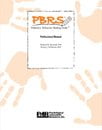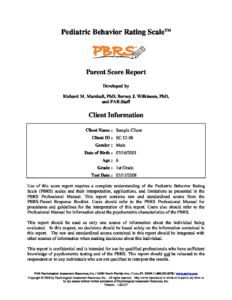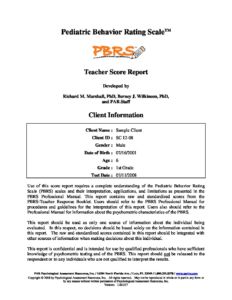
Pediatric Behavior Rating Scale pbrs
For: Assist in the identification of symptoms associated with early onset bipolar disorder
Reading Level: Child - Adolescent
Format: Paper-and-Pencil
Length: 15 - 20 minutes
Scoring: Hand Scored
Online Forms, Reports, Kits & e-Manuals
All online resources including Forms, Reports, i-Admins, Kits and e-Manuals.
Printed Forms & Handscoring Materials
Test forms, response booklets and scoring reference manuals.
PBRS online Score Report (each) min order 5
PBRS online i-Admin (each) min order 5
PBRS Parent Score Summary/Profile Forms (Pad of 25)
PBRS Reusable Parent Item Booklets (25)
PBRS Reusable Teacher Item Booklets (25)
PBRS Teacher Score Summary/Profile Forms (Pad of 25)
Authors
Richard M. Marshall, PhD and Berney J. Wilkinson, PhD
Description
Appropriate for use with children and adolescents ages 3-18 years, the PBRS is a standardised, norm-referenced parent and teacher rating scale that assists in the identification of symptoms associated with early onset bipolar disorder. The instrument also aids in identifying comorbid disorders as well as in differentiating disorders that have similar symptoms and behavioural characteristics. Rather than rendering a clinical diagnosis, the PBRS focuses on symptom identification and profile analysis.
Uses a multi-informant approach – The PBRS has a Parent Version Response Booklet and a Teacher Version Response Booklet that provides the examiner with information about a child’s symptoms or an adolescent’s symptoms and behavioural characteristics both at home and at school. A key characteristic of early onset bipolar disorder is that a child generally may display a higher rate of mood instability and aggression at home versus in school.
Assists in identifying comorbid disorders and differentiating disorders that have similar symptoms and behavioural characteristics – The items on the PBRS capture elements that are unique to early onset bipolar disorder including mood swings, chronic irritability, grandiosity, explosive outbursts, and emotional meltdowns while at the same time aiding in identifying symptoms that are associated with documented comorbid disorders (e.g. ADHD). These same items may also be helpful in making a differential diagnosis.
Applicable in a variety of settings – The PBRS has numerous applications in clinical, educational, and research settings. It may be used as an assessment tool to assist in symptom identification and differential diagnosis in clinical settings. In educational settings, the PBRS provides educators with a more complete picture of the child’s symptom complex so that they can work with parents and other professionals to better determine the importance of these symptoms and to structure activities in the classroom; this, in turn, may assist with meeting the child’s needs within the parameters of the Individuals With Disabilities Education Improvement Act of 2004 (IDEA). The PBRS may also be used in research settings to aid in identifying early onset bipolar disorder, to differentiate it from other related disorders, and to judge the efficacy of interventions aimed at ameliorating the associated symptoms.
Standardisation, Reliability, and Validity
The PBRS Normative sample was composed of 541 parents and 610 teachers of children ages 3-18 years and was well-matched to the U.S. population for age and gender. In addition to the Normative sample, data were collected on a Combined Clinical sample of 224 parents and 194 teachers of children ages 3-18 years. Five specific clinical groups make up the Combined Clinical sample: (a) Bipolar Disorder, (b) ADHD, (c) Oppositional Defiant Disorder, (d) Conduct Disorder, and (e) Pervasive Developmental Disorder.
NB: Prices are in Australian dollars inclusive of GST. NZ customers need to log in to view ex-GST prices.





